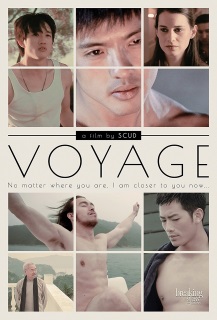

|
|
Voyage
R1 - America - Breaking Glass Pictures Review written by and copyright: Eric Cotenas (29th May 2018). |
|
The Film
 Having fallen into a deep depression, psychiatrist Ryo (Ryo van Kooten) rents a cabin cruiser and mounts a solo journey along the Southeast Asian coast. Recouting a series of stories he has come across in his practice, he reflects on them and his own story of tragedy to decide whether he can move on or end his life. Most interesting is "Messengers to Heaven" in which a young student Yan (Byron Pang) is sent to Inner Mongolia as part of Mao's re-education program targeting academics. His books confiscated - apart from Mao's Red Book - and the growing uncertainty that he may never see his parents again cause him to withdraw in spite of the spark of attraction he feels for one of his hosts. In "The Woman Who Can Tell Everything", Malaysian horiscopist Lady Red (Susan Yam-Yam Shaw) no sooner consigns the dead loved one of a client to the Plutonian territory where the dead who have died before their time reside than she experiences a genuine vision in which she learns her own son (Jason Poon) is taking a detour there via an overturned bus in Taiwan. In "Fall in Love", Leni (Leni Speidel) is not on the same page with her artist lover Sebastian (Sebastian Castro), so he make a fatal romantic gesture that precedes an even more deeply felt loss in store for Leni. In "Mute Fate", mute Ming (Haze Leung) and his maid Leela (Sau Wong) live lives of quiet despair that continue well after one of them crosses over. In "Last Words", Uncle Chan (Cheung Fai), having lived a full life with a happy marriage, children, grandchildren, and success in business decides that he wants to skip the pain of aging. On the flipside, hotshot young actor Ryan (Ryan Zhu) finds that depression has left him unable to enjoy either his past successes or his hopeful future prospects. With a little help from the ghost of father (Leon Hill), Ryo faces his own guilt over not seeing the signs in his own ill-fated relationship with Adrian (Adrian Heung). Dedicated to those lost and those left behind - including loved ones of several of the cast members - Voyage is not a work of suicidal adulation but an exploration of the ways people experience depression and loss. It is more interesting as a series of short film more so than a complete work, with some of the locations - including the Scud-emblazoned cabin cruiser - popping up in his later feature Utopians.
Video
Breaking Glass' progressive, anamorphic widescreen transfer is as variable as the source with the HD videography making use of highly saturated colors, digital effects, and sometimes dark lighting.
Audio
The Dolby Digital 5.1 and 2.0 audio is mostly in English with some German and Chinese dialogue subtitled as well as English (CC) Closed Captioning. Subtitles for the feature and extras are turned on with an option in the extras menu.
Extras
The making-of featurette is of middling value since none of the foreign dialogue is subtitled so only the comments in English from the director and some of the actors will be understandable for most viewers.
Overall
Dedicated to those lost and those left behind - including loved ones of several of the cast members - Voyage is not a work of suicidal adulation but an exploration of the ways people experience depression and loss.
|
|||||

|